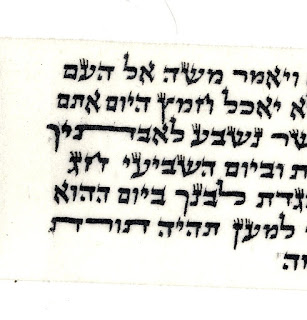Popular posts from this blog
Klaff Tanning question:
By
Rabbi Eli Gutnick
-
I received this question via email. I am not really a klaf expert, I was wondering if anyone could answer this question: Dear Rabbi Gutnick, I am writing to you because a good friend of mine has put the idea into my head that the klaf in my tefillin were not really tanned and therefore are not kosher. He referred me to Megilla 19a re diftera. From the research that I have done so far, it seems that the klaf that is used today is tanned only with a lime wash. On all of the tanning websites I’ve seen so far, they say that the lime doesn’t accomplish tanning but only the removal of the hair and some other pre-tanning effects. Would you be able to explain to me or refer me to a website that explains how the tanning process that is used today takes the hide out of the category of diftera? Thank you very much.
Rabbi Reuvain Mendlowitz clarifies his position on Ksav Chabad (and my final thoughts)
By
Rabbi Eli Gutnick
-
Last week I posted some thoughts in response to a public lecture given by Rabbi Reuvain Mendlowitz regarding Ksav Chabad (the Alter Rebbe's ksav). I felt he did not represent the issue fairly, and since I had received questions about it from a number of people I felt it made sense to write a general response. After I posted my response on this forum, Rabbi Mendlowitz reached out to me by email and we ended up having a respectful and productive email exchange regarding the relevant issues surrounding Ksav Chabad. His position is a lot clearer to me now, and I think he also took certain things on board that I clarified with him. The purpose of the Stam Forum (at least back in it's heyday before all the whats app groups took over) was to connect sofrim from around the world, to promote achdus and build bridges, as well as to offer support and advice. In that spirit, I felt I should write a follow up post, to clarify some of the issues and misconception...


Very strange. In the word חמץ the letter ח is ktav HaAri. In the word חג the letter ח is Ktav Beit Yosef. How is this possible?
ReplyDeleteIt happens when a Sofer who usually writes Beis Yosef decides to write an Arizal product (or vice versa). Habit and instinct sometimes take over.
ReplyDeleteOf course, a responsible Sofer will go over it and fix it, where possible.
In this case, perhaps he did look it over and thought that if he 'clipped' the בליטת הזיין from the right, that it would leave too big a space between השביעי and חג. Maybe....
ReplyDeleteI assume you are worried about the mechikah and stretched tav in l'avoshecha?
This stretched tav could just be that he tried to get another word in the line and then saw it wasn't happening so he erased the second word (bshas ksiva) and stretched to get to the end of the line. It does not reek of lo kesidron as the other one did.
However once you don't trust someone, doubt will crop up everywhere...
no one would stretch a letter to end up out of line
Deletehe stretched and left the space for two letters but messed up the yud somehow making it bigger (maybe because he wrote on the mechika) and that's probably how he ended up going out of the line.
Delete